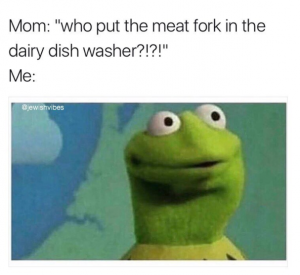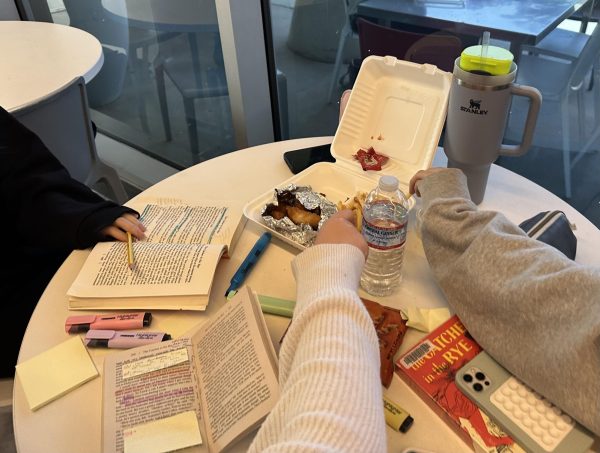Niche memes are connecting Jews worldwide with humor and some bite
Yaakov Fein, more commonly known by his Instagram meme username @theturntjew, is just one of many Instagram meme page creators who have become popular for posting memes featuring relatable jokes about Judaism, targeting a Jewish audience.

For all those times you accidentally let kashrut slip your mind in the kitchen.
He has made more than 630 memes on his account, which has 4,500 followers as of late October.
A recent one that received more than 350 likes was was about sin — aveirah — and the evil inclination, or yetzer hara — timed for the Yom Kippur. “When you do an aveirah and the yetzer hara is trying to convince you that it’s not a big deal,” he wrote, as a caption for a photo of an attorney’s ad stating, “Just because you did it doesn’t mean you’re guilty.”
Yaakov, 24, grew up in Seattle as a Conservative Jew, and later became Orthodox on his own, and now lives in Jerusa- lem, Israel. He started his meme page a little over a year ago, right after graduating from Yeshiva University with a degree in marketing. Since then, he has made aliyah and lived as a counselor at Yeshiva Mevaseret in Jerusalem.
Yaakov, or maybe his alterego @theturntjew, started out sending relatable jokes to a WhatsApp groupchat with his friends from yeshiva. He realized these jokes could resonate with many others, not just his yeshiva friends.
“They honestly just pop in my head,” Yaakov said in a phone interview. “Some people think I sit down for hours coming up with ideas, but if I see something a joke just comes to me.”

Addresses the complicated relationship between Orthodoxy and Women of the Wall
Though niche, Yaakov is not the only Jewish meme account on Instagram. There are many others, including @ jewishvibes, @jewishmemes2.0, @chassidishemagnets and others.
The pages all post funny memes about Jewish holidays, culture, laws and life. Many of them are administrated by Orthodox Jews, and some therefore require knowledge of observant practice. But Jews across the denominational spectrum follow the accounts to see something that is Jewish, humorous and relatable.
Another meme page is @jewishvibes, which has 6,300 followers and 150 memes as of late October. The account is dually run by Daniel Estrugo, a graduate of Salanter Akiva Riverdale (SAR) high school and a current Yeshiva University finance student; and Frisch School graduate Mikey (Michael) Greenblatt, who studies at CUNY Baruch.
“I just saw that there was no real content online about Modern Orthodox life,” said Daniel in an interview. “A lot of Jewish media is Reform, so we saw an opportunity for a meme account in this niche market.”
Mikey joined after Daniel made the account, and said he comes up with his ideas by paying more attention at Shab- bat lunch, for example. Meme content creators must always be on the lookout for relatable jokes.

Everyone can relate: quick reminder to clean up your act.
A lot of their followers are yeshiva day school students or young graduates. A few, they said, are also converts.
“They probably search ‘Jewish’ on Instagram,” said Daniel of his followers. He said a lot of them say they are Jewish converts in their Instagram bios.
Shalhevet senior Ilan Bouskila said he likes Jewish meme pages @jewishvibes, @theturntjew and @jewishmemes2.0. “The memes are especially relatable, and it’s cool to feel like you’re in on an inside joke that very few people get,” said Ilan.
He compared it to the proliferation of memes about the PSAT he’s noticed after all students in the U.S. take the exam.
“All the kids are like ‘wow, it’s crazy that, like, me and just a few million other teenagers can relate to this, it’s the coolest thing ever,’” he said.
Yaakov Fein said he has had a steady increase in followers, except for when the even more popular page @jewthings — with 44,000 followers — re-posted one of his memes.
Around 30 of his followers are Shalhevet students. Junior Honor Fuchs said she likes what Yaakov’s memes represent in the broader landscape of media.
“They have some pretty fire memes,” said Honor. “And it’s also refreshing when you hear a Jewish joke that isn’t anti-Semitic. If anything these memes are lifting up Judaism, so it’s nice to see that.”

Sarachek victories determine your future… you know its true.
Most of his posts have the same image as a meme that’s already popular on more mainstream meme accounts, but with a Jewish spin for the caption. His memes vary in subject matter and humor. A lot of them are seasonal – after Yom Kippur, he posted a photo of a girl looking judgmental with the caption, “When Yom Kippur ended 10 minutes ago and someone’s already speaking lashon hara,” or gossip.
But when there are no holidays, he turns to timeless jokes about Jewish practices, like shidduch dating (dating that uses a matchmaker). For example, he posted a photo of a woman holding an edited spinner wheel with different possibilities for the wheel to land on, such as “memes,” “conspiracy theories,” “unwanted opinions” and “jokes about my suffering.”
One of the most risky memes he has posted took a popular meme format of a woman smiling at something on her phone, and in the next frame frowning at something else on her phone. In Yaakov’s post, the woman is smiling at “Women getting more involved in Judaism,” and then she frowns at a photo of a Women of the Wall protest.
Yaakov said he noticed a small decrease in followers after that post. But it wasn’t all bad, and some of his best experiences with the page have involved what’s been controversial. Following the Women of the Wall post, a female follower of his privately messaged him and said she didn’t understand the meme. She likely came from a Conservative or Reform Jewish background, Yaakov said, and didn’t understand how there could be a difference between women positively getting involved in Judaism and Women of the wall.
Yaakov told her about the halacha that has been interpreted to mean only men can wear tefillin or read from the Torah, that a mechitza is integral to Jewish prayer and his other stances.
“I think Women of the Wall is just more of a feminist movement than women sincerely trying to connect to God,” Yaakov said.

All those times you let your inner demons take over.
But Honor, who has worn tefillin before and supports Women of the Wall, was offended by the post.
“It defeats the purpose of having a Jewish meme account if you bring Jews down for their opinions,” said Honor.
Yaakov is religiously Orthodox and politically conservative, and he often posts about this as well, usually mocking Modern Orthodox and Open Orthodox Jews. A lot of his more risque memes reflect these traits.
On the political side, for example, he wrote the caption “How do you sleep at night knowing that you deciding to make Aliyah has further contributed to the Israeli occupation of Palestine?” accompanying a photo of a man sleeping blissfully on clouds.
The idea was to show that he sleeps easily knowing he is occupying land that is considered by many to be Palestinian.

The struggle of staying home for Pesach.
What hits closest to home for Shalhevet students is comedic teasing of Modern Orthodox Jews for being hypersensitive and overly particular about their denomination. But that does not mean they’re offended by it.
“I think it’s hilarious, it’s clearly a joke,” said Ilan Bouskila. “When people take those things to heart, they’re just taking themselves too seriously.”
Yaakov’s meme page @theturntjew also sometimes earns him money. One of the marketers of a Birthright program called Yael Adventures contacted him to advertise through his page. When people sign up for the program with his referral code, “TheTurntJew,” he now makes a commission.
He promotes this by having this information in his Instagram bio, and posting memes about Birthright where he references signing up for the program. Some more mainstream meme accounts, like Claudia Oshry Soffer’s @girlwithnojob, make a fulltime salary through advertising the page. Claudia’s boyfriend, Ben — @boywithnojob — also went to Yeshiva University, according to Yaakov. The pair has since married (his name is Ben Soffer).
Now — thanks to Jewish memes — they both have jobs.
Click here to view @jewishvibes on Instagram
Click here to view @theturntjew on Instagram

Hannah Jannol was Editor-in-Chief of the Boiling Point during the 2017-2018 school year. Since then, she has attended The New School and written for their HerCampus chapter; edited obituaries for The Trace; written poetry for Eleven and a Half literary magazine, and run Instagram and Twitter for Uptown Stories. Her favorite parts of being on Boiling Point were production night and writing long-form features stories, many of which won awards from CSPA, Quill & Scroll and the American Jewish Press Association.










